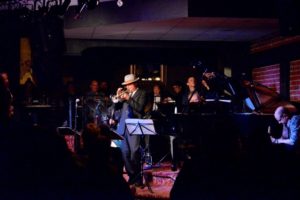It’s not just about the music for Hermann’s Jazz Club manager Nichola Walkden. For 40 years, the club has been bringing people together, making multi-generational impacts through music and giving people hope. But it’s been hard—really hard—this past year. She and her all-women management team have gotten creative and provided what she calls an essential service of sorts by offering streaming concerts, because people need music, she says.
“Jazz music relies on social interaction,” she says. “It’s a unique form of music in that it relies entirely on interaction. It’s a live forum. These aren’t orchestral members who rehearse and come together and do something exact and precise and beautiful; they’re people that come together to challenge the direction of music and create, actively, while they’re on the stage.”

Walkden acknowledges that Hermann’s would not be where it is today without government subsidies to help during COVID-19, but she’s cautiously optimistic about the future. The Hermann’s crowd has never taken their position as listeners for granted, she says.
“It has been a community that has said, you know, ‘We’re keeping this for us,’” she says.
Hermann’s thrives on a trifecta, Walkden says, of audience, club, and musicians.
“When you do see these musicians that have been quarantined for a little while come back on the stage, they are rusty, and they do get more frustration, but frustration is in an active conflict that produces music,” she says.
Local folk/roots musician Oliver Swain, who plays at Hermann’s regularly, says music is the main ingredient that has kept him stable through the pandemic. The club’s quick transition to online streaming in mid-April of last year provided a lifeline not just to the artistic community, he says, but to audience members who depend on music for mental well-being.
“It just goes to show that this is an organization that has always put artists and audiences first,” he says. “I think the only shows I’ve done [since the pandemic] have been out of Hermann’s.”
When it comes to streaming, Swain says a lot of the production values in general have had to be very low. That’s fine for the first couple weeks—streaming from laptops and whatnot—but if it’s going to be a long-term alternative, professional video and sound production is a must, and Swain says that Hermann’s gets that.
“That aspect just shows that Hermann’s understands what audiences need, and what artists need, and are consistently putting that first,” says Swain.
Walkden says that even through the pandemic, they’ve never “been able to slow this stage down.”
“Musicians want to play,” she says.
Swain has played at Hermann’s for almost 30 years, beginning with student jazz night on Tuesday nights when he was in school. Streaming, he says, doesn’t allow for the privacy of a rehearsal or the intimacy of a live show. He says that the energy of playing live is irreplaceable.
“It is a major adjustment and something that we’re possibly just really thankful to be able to do now, but I don’t think it’s going to be a big part of my career moving forward, as long as we can get those audiences back,” he says.
Walkden has conflicting thoughts on the matter. Audience complacency and comfort found in streaming is something she worries about, but she also knows audiences need the real thing just as much as the musicians.
“No, guys,” she says. “We’re gonna dance. Keep your legs going.”
See hermannsjazz.com for info on upcoming events.
